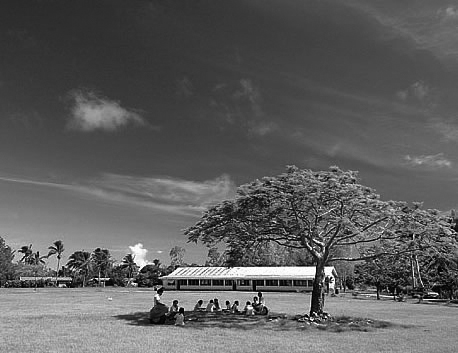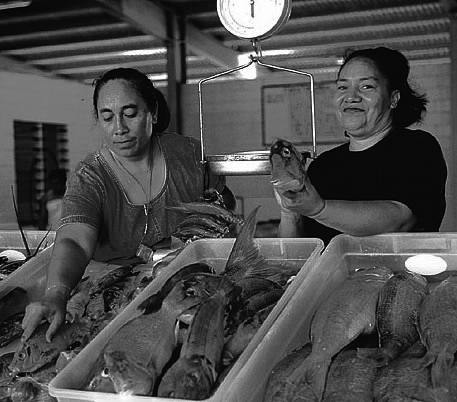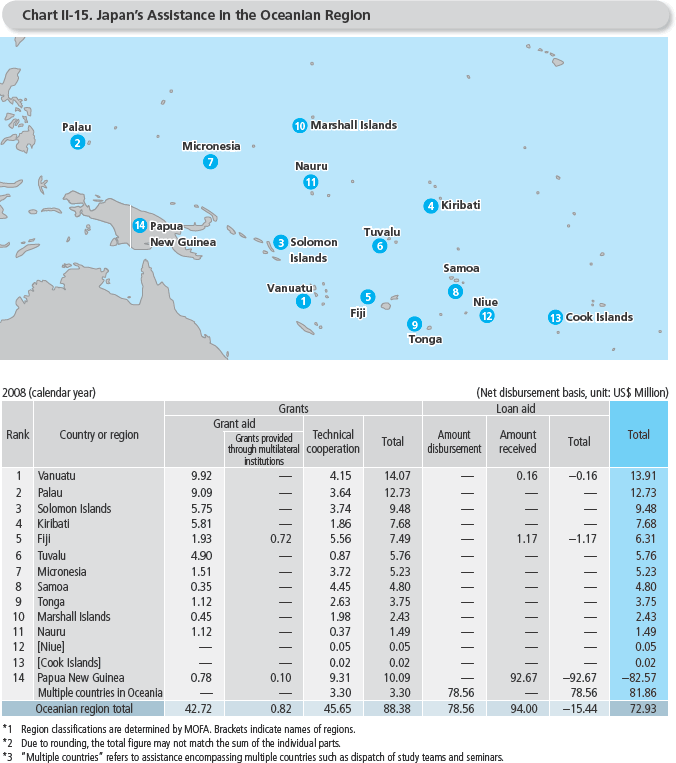Japan's Official Development Assistance White Paper 2009
7. Oceania
•Approximately US$72.93 million (approximately US$166.94 million)
•Approximately 1.1% of total bilateral aid (approximately 1.1%)
Japan and the Pacific island countries are neighbors sharing the Pacific Ocean. They have strong historical ties. Having an immense Exclusive Economic Zone (EEZ), the region provides strategic sea lanes for maritime transportation and an important ground for Japan's deep-sea fishery industry. Therefore, sustainable peace and prosperity in this region are extremely important for Japan.
Many Pacific island countries have achieved independence relatively recently. It is crucial for them to become socially and economically self-reliant states. There are a number of difficulties which island nations face in particular, such as small-scale economies, dependence on primary industries, geographic dispersion, lack of easy access to international markets, vulnerability to natural disasters, and the risk of losing land territory. Furthermore, the region faces problems relating to democratization, such as the political change in Fiji.
Based on such circumstances, and as a friendly partner of Oceania, Japan provides assistance taking into account the individual situations of each country.
<Japan's Efforts>
To achieve political stability and independent economic development in Oceania, it is essential to overcome social and economic weaknesses and pursue regional cooperation. Japan has promoted cooperation with the Pacific Islands Forum (PIF), a framework for regional cooperation composed of the leaders of the Pacific countries. The Japan- Pacific Islands Forum (PIF) Summit Meeting, a leaders' meeting of Japan and the PIF countries, has been held once every three years since 1997.
In May 2009, the 5th Japan-PIF Summit Meeting was held in Tomamu, Hokkaido, where Japan pledged assistance totaling approximately ¥50 billion over the ensuing three years. In the sectors of environmental and climate change, Japan proposed the Pacific Environment Community (PEC), which is a framework where Japan and Pacific island nations work together to cooperate via international negotiations and other efforts.
•For more information on assistance for environmental and climate change in the Pacific region, see Part I, Chapter 3, Section 3.
Japan also provides assistance to Pacific island states from the perspective of human security in order to aid them in overcoming vulnerabilities. Specifically, Japan has provided assistance to improve basic living conditions—such as through human resources training for 2,000 people and the construction of schools and hospitals—as well as aid for sustainable agriculture and fisheries. Moreover, in order to enhance human exchanges Japan will implement the "Kizuna Plan," which includes youth exchanges between Japan and Pacific island countries of over 1,000 people over the ensuing three years.
The island countries of the Pacific face common development problems in the education, environment, and health care sectors. In order to achieve the sustainable development of these countries, Japan provides regional cooperation not only to each individual country, but also the entire Pacific region, taking into account region-wide benefits. For instance, Japan provides grant aid to help build a center at the University of the South Pacific (USP) in Fiji that carries out research on areas such as information and communications technology, and provides the related machinery and equipment for the center. In addition, through assistance for developing distance learning network facilities for USP, Japan provides a wide range of island nation inhabitants with the opportunity to receive secondary education. Japan also contributes to resolving the region's environmental problems through such efforts as dispatching experts to the South Pacific Regional Environmental Programme (SPREP), a regional international agency in Samoa, providing training for waste countermeasures, and assisting in the preparation of a waste countermeasures master plan.
Japan also takes part in various regional undertakings in measures against infectious diseases. For instance, in order to strengthen vaccination projects in the region, Japan has extended cooperation together with the World Health Organization and UNICEF in implementing the Expanded Programme on Immunization (EPI) focused on safe inoculations, including provision of vaccines, maintenance of cold chains, and safe disposal of medical waste. Therein, assistance is provided to improve the rate of immunization against measles and Type-B hepatitis, eradicating filariasis, and HIV/AIDS prevention.
Regarding its collaboration with international organizations, under the framework of the "Accelerated Co-Financing scheme with ADB (ACFA)," Japan provided Samoa with an ODA loan in December 2007, which encompassed the building and repairing of efficient power plants, disaster countermeasures by laying power lines underground, and upgrading to high-efficiency power lines.


Photo: Kenshiro Imamura/JICA
The Project for Improvement of Funafuti Port (Tuvalu)
Funafuti Port is the only port in Tuvalu where large-sized vessels can come alongside the pier. However, problems such as aging piers, lack of equipment for loading and unloading, and container yards with inadequate space cause a decrease in loading and unloading efficiency. Through grant aid totaling ¥930 million, Japan works to develop the port's piers and yards, improve bonded warehouses, and ameliorate loading and unloading efficiency. These efforts have allowed Japan to contribute to the economy of Tuvalu by boosting cargo transport capacity, cutting transport costs, and ensuring that cargo handling and ship navigation is conducted safely.

